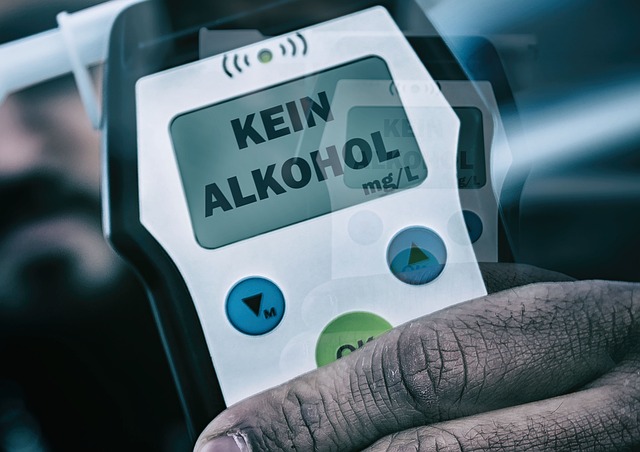Understanding your rights during a traffic stop is crucial for maintaining safety and legality, especially with the advent of tech solutions for impaired driving. These solutions, including breathalyzer apps, wearables, AI data analytics, driver assistance systems (DAS), and autonomous emergency braking (AEB), enhance road safety by detecting impairment accurately and preventing collisions. Both law enforcement and drivers have a shared responsibility to ensure fairness during stops, utilizing these technologies while adhering to clear guidelines for a safer future on the roads.
“In a world where technology is constantly evolving, understanding your rights during a traffic stop is more important than ever. This comprehensive guide explores crucial aspects of driver safety and legal protections, particularly in light of modern tech solutions for impaired driving prevention. From the impact of technology on enforcement to future innovations, we delve into best practices for both law enforcement and drivers, ensuring safer roads for all.”
- Understanding Your Rights During a Traffic Stop
- The Impact of Tech on Impaired Driving Prevention
- Modern Devices to Enhance Driver Safety
- Legal Implications and Rights Protection
- Best Practices for Law Enforcement and Drivers
- Future Tech Solutions for Safer Roads
Understanding Your Rights During a Traffic Stop

During a traffic stop, it’s crucial to know your rights to ensure a safe and lawful interaction with law enforcement. While officers have specific protocols to follow, understanding your own rights can help de-escalate potentially tense situations. Remember, you have the right to remain silent; anything you say can be used against you in court. This is particularly important when dealing with potential Tech Solutions for Impaired Driving charges, where evidence collection and procedures are strictly regulated.
Additionally, you’re entitled to know the reason for the stop, and an officer must provide a reasonable explanation. If you believe your rights have been violated or the stop was unjustified, politely assert yourself while staying calm. It’s advisable to document the encounter by remembering details like the date, time, location, and any unusual behaviors or statements made by the officer. This knowledge can be invaluable if the situation escalates or later requires legal recourse.
The Impact of Tech on Impaired Driving Prevention

In today’s digital era, tech solutions for impaired driving prevention have revolutionized road safety. Advanced technologies such as breathalyzer apps and wearables offer new ways to detect impairment, enabling law enforcement to make more accurate decisions during traffic stops. These innovative tools can quickly measure blood alcohol levels, providing a non-invasive and efficient method to identify drunk or drugged drivers.
Additionally, data analytics powered by artificial intelligence (AI) play a significant role in identifying patterns and trends related to impaired driving. By analyzing vast datasets, AI algorithms can predict high-risk areas and times, helping law enforcement agencies allocate resources more effectively. This proactive approach not only prevents accidents but also educates the public on the dangers of impaired driving, fostering a safer environment for everyone on the roads.
Modern Devices to Enhance Driver Safety

Modern devices and tech solutions play a pivotal role in enhancing driver safety, especially when it comes to addressing impaired driving. Advanced technologies such as driver assistance systems (DAS) are now standard features in many vehicles. These systems use a combination of sensors, cameras, and radar to monitor a driver’s behavior on the road, alerting them to potential hazards and preventing accidents caused by distracted or drunk driving.
One notable tech solution for impaired driving is the development of autonomous emergency braking (AEB) systems. These innovative features can detect obstacles and apply the brakes automatically if a driver fails to respond in time, significantly reducing the risk of collisions. Additionally, smartphone apps that monitor driving behavior and detect signs of impairment are becoming popular, offering another layer of protection on the roads by encouraging responsible driving habits.
Legal Implications and Rights Protection

When pulled over during a traffic stop, understanding your rights is paramount. While law enforcement officers have specific protocols and authorities, citizens also possess protections under the law. Knowing these rights can help ensure fair treatment and safeguard against potential misuse of power. Many jurisdictions provide clear guidelines on what police can and cannot do during stops to prevent excessive force or discrimination.
Tech Solutions for Impaired Driving play a significant role in upholding these rights. Advanced technologies, such as breathalyzer devices and field sobriety tests with integrated data logging, offer more precise and unbiased assessments of driver impairment. These tools not only enhance safety but also provide clearer evidence for legal proceedings, ensuring that both officers and individuals involved are protected under the law.
Best Practices for Law Enforcement and Drivers

When it comes to traffic stops, both law enforcement and drivers have a shared responsibility to ensure safety and maintain fairness. Law enforcement officers should approach each stop with a clear mindset, focusing on verifying license and registration information while observing driver behavior for any signs of impairment or other illegal activities. Utilizing tech solutions for impaired driving, such as field sobriety tests assisted by portable devices, can enhance accuracy and efficiency during these interactions.
Drivers, on the other hand, should remain calm and respectful throughout the stop. They have a right to know the reason for the pull-over and can politely ask questions if they believe their rights are being violated. Keeping all doors locked and windows closed until requested to exit by an officer is crucial for personal safety, especially in areas with high crime rates or potential threats. Remember, clear communication and adherence to legal guidelines are key to a positive traffic stop experience for both parties.
Future Tech Solutions for Safer Roads

The future of road safety lies in innovative tech solutions that aim to prevent impaired driving and enhance overall transportation security. Advanced driver-assistance systems (ADAS) are at the forefront of this revolution, with features like automated emergency braking, lane departure warning, and adaptive cruise control significantly reducing human error on the roads. These technologies not only assist drivers but also act as robust deterrents against drunk or distracted driving.
Moreover, autonomous vehicles equipped with sophisticated sensors and AI capabilities promise to revolutionize transportation. By removing the element of human judgment, which is often impaired by alcohol or fatigue, self-driving cars have the potential to drastically cut down on accidents caused by driver error. In combination with stricter enforcement and education initiatives, these tech solutions for impaired driving could lead to safer roads and a significant reduction in traffic fatalities.
In conclusion, understanding your rights during a traffic stop, leveraging modern tech solutions for impaired driving prevention, and adopting best practices for both law enforcement and drivers are pivotal steps towards creating safer roads. As technology continues to evolve, we can expect even more innovative tech solutions for impaired driving to emerge, further enhancing driver safety and reducing the impact of impaired driving on our communities.






